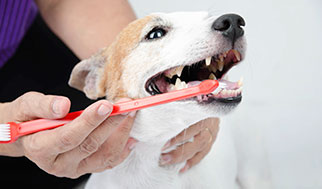Well Pet Visits
It is not actually accurate that one year of your pet’s life equals 7 years of human life…
But nonetheless, one year of their life is a bigger chunk of their lifespan than is one year of yours.
Now, when managing your own health, you are supposed to get a yearly check-up. Even if you don’t, you can talk: if you feel that something is going on with your health you can communicate it, and you have the ability to pick up the pone and make a doctor’s appointment.


A lot can change in a year for a pet; and if a pet is starting to develop a health issue, they are relying on us humans, their caretakers, to pick up on it and take care of it.
With careful questioning, we will tease out information of how things have been going for the last little while, to get a picture of what sort of Presentation we are seeing in this pet (for example narrowing down ADR to: is it pain? Is it weakness? Is it nausea?)
So what does your pet get out of a checkup (yearly for adults, twice a year for senior pets)?
- Monitoring weight: in adults, we are usually looking out for them being overweight. In seniors, we may be facing weight loss as their ability to process and absorb nutrients declines. A sudden decrease in weight is often the earliest sign of many serious diseases.
- Dental health: for all the jokes there are about “doggy breath”, foul breath is NOT normal. It means there are a lot of bacteria making themselves at home in there. Dental pain can be significant, and the infection going on in a bad mouth is a burden weighing down the rest of the body. Infection from the teeth can also spread to other organs, such as the heart valves, the lungs, and the liver and kidneys. Regular exams let us keep track of the teeth, and intervene when we need to – whether that means teaching you to do tooth brushing, or booking the pet for a full dental assessment and cleaning.
- Heart health: changes in the heart will often be apparent through the stethoscope, before they are making their presence felt by causing illness. The sooner heart disease is detected, the better it can be managed.
- Joint health: Did you know a lot of “old” pets are not as “old” as you think they are? Sometimes “slowing down” is because moving around is too difficult, and “crotchety” is actually pain. Regularly checking the comfort and range of motion of joints means we can pick up on arthritis sooner rather than later, and have a better shot at managing it.
- Skin health: Changes that are slow can be hard to notice. Sometimes that leathery skin, or greasiness, or scaling, can develop so gradually that you thought nothing of it. Regular exams give us a chance to pick up on skin problems before they are advanced.
- Labwork: evaluating blood, urine and stool samples gives us a wonderful window into the pet’s health. Regular labwork gives us a baseline against which to compare later; and is often the earliest indicator that something is going wrong.
Our goal is for your pet to have a long, healthy, happy life.
Regular check-ups are the best route to keeping your pet as well as can be for as long as can be.

